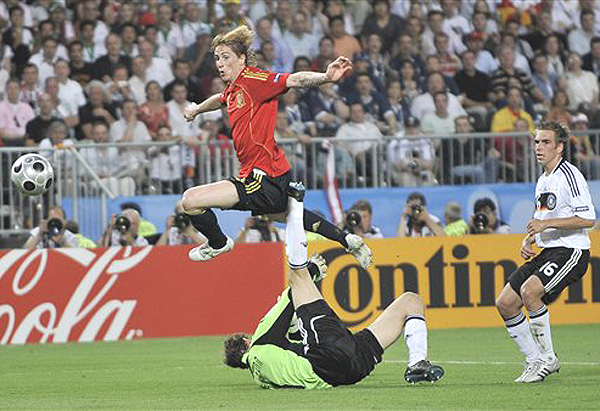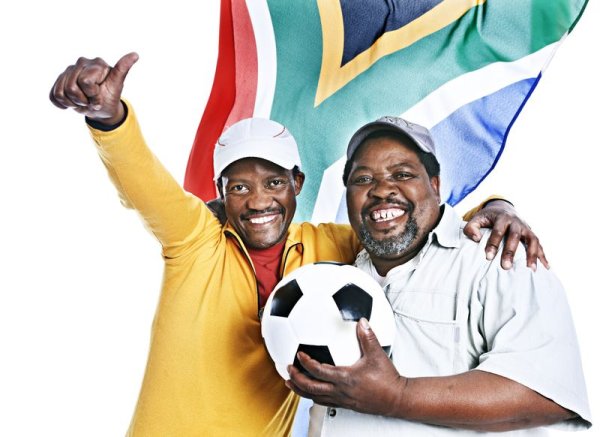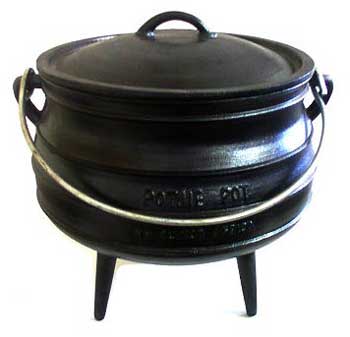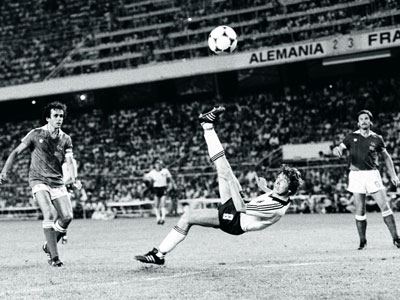South African fans have jumped on and off so many bandwagons since Bafana Bafana’s phyrric victory against France that I’ve lost count — BaGhana, Brazil . . . Spain. ‘We also speak Spanish,’ South Africans seemed to be saying in unison on Wednesday night at Durban’s Mabhida Stadium.
I arrived at Mabhida around lunchtime for my interview with France24 — the French satellite news channel. Next to me, young men from various French and German channels recorded their match previews. Seven hours ’til kickoff. As I walked across the train tracks and over the bridge that separates King’s Park Rugby Stadium from Mabhida Stadium there were far more police officers than football fans.
A friend and I ate lunch at the nearby casino right on the beach. By mid-afternoon we could finally imbibe in World Cup atmosphere, with the usual parade of replica jerseys, flags, funny hats, and photo ops. A group of masked Spaniards entertained us at a beachside party.
Coach Milton Dlamini and I boarded a kombi taxi to go check on his car in a parking lot 10 minutes away. The young driver blasted local hip hop while negotiating the swelling waves of cars, buses, and kombis moving slowly towards the stadium. Once we ascertained that everything was cool with the car, the taxi driver took us back. As we approached the ground, Milton enthused about The Arch.
Once inside, we met our mates from the local football coaching world (thanks Thabo!). Spain and Germany warmed up sparking esoteric discussions about tactics and the pros and cons of static vs dynamic stretching. Lineups are announced: Pedro instead of Torres and Trochowski taking suspended Mueller’s place.
Immediately it became obvious that Germany would spend the match in hiding. Spain patiently kept the ball and made sure not to give the conservative Germans any chance to launch counterattacks, the kind that devastated England and Argentina. The best chance of the half fell to Puyol whose header off a corner narrowly missed the target.
Spain came out in the second half meaning business. Xavi continued to dictate the tempo and direction of play in the midfield, while the Germans struggled to string together more than three passes. The noose tightened. Pressure on Germany’s goal mounted, with three consecutive chances for Xabi Alonso (twice) and Villa. When Podolski prevented Sergio Ramos from scoring it seemed to symbolically capture the match: a defender denied by a forward!
Eventually it happened. Puyol rose high and clear to head home a Xavi corner. Gooooooooool!!! Pedro could have closed the game with a one-on-one breakaway but somehow managed to fumble over the ball and neither shoot nor pass (to Torres). He looked disconsolate when the coach pulled him a minute later. But when the final whistle blew every Spanish player celebrated wildly on the pitch: La Furia Roja made it to their first World Cup final. Fiesta time! South Africa 2010 will produce a first-time winner: Spain or, less likely, The Netherlands.
Tag: Germany

Tonight I return to Mabhida Stadium for what might become one of the greatest World Cup matches of all time: Spain v Germany. The winner to face The Netherlands in the final on Sunday at The Ukhamba (calabash in isiZulu). Today’s rematch of the Euro 2008 final (hence the photo) is the biggest thing to hit Durban since Nelson Mandela cast his first vote in a free and democratic election here in 1994.
Spain is the side many fans and pundits (including me) picked to win the 2010 World Cup. At its best, La Furia Roja plays delectable futbol romantico that is not only pleasing to the eye but also supremely effective.
Germany is the highest scoring and top performing team in this World Cup. But do the memorable thrashings of England (4-1) and Argentina (4-0) mean that the Nationalmannschaft has peaked too early? That German octopus thinks so.

There’s nothing like this: the German Academic Exchange Service‘s ‘Extra Time’ soccer lecture series. It links the two host countries of 2006 and 2010, and celebrates the first ever World Cup on African soil. Featuring German, South African, and international scholars, the eight lectures aim to inspire public debate on the social and cultural dimensions of football. The events take place in World Cup host cities which are also university cities.
On Friday, 7 May, the focus is on ‘Soccer and History’. I will speak about African Soccerscapes, Philip Bonner (Wits University) on the game’s past in the Johannesburg area, Sedick Isaacs on soccer in Robben Island prison, Christiane Eisenberg (Humboldt University Berlin) on the history of FIFA.
The event is free and open to the public. It kicks off at 9:30 a.m. in the Senate Chamber, University of KwaZulu-Natal, Durban Westville Campus.
Click here for the complete schedule of the German-South African Soccer Lecture Series.
Pot Observations
TEN POT OBSERVATIONS.

1. FIFA got the seedings right. Pot 1 seeds earned their ranking. France did not. France’s final appearance was four years ago.
2. Chile, Paraguay and Uruguay have come out of the pot alignment better than most. Each of the smaller South American nations will avoid the big five African qualifiers in the 1st Round.
3. Argentina and Brazil cannot avoid the African qualifiers from Pot 3. The seeds for two potential Groups of Death have now been sown. Has FIFA put Brazil at risk for an early bath?
4. The most frightening Group of Death would be: Brazil, Mexico, Côte d’Ivoire and Portugal.
5. The dark horse of Pot 2 is Honduras.
The Recidivist
How not to clear a football. Hamburg SV’s Ze Roberto and David Jarolim score 2 nearly identical goals within 86 seconds against Hertha Berlin. Berlin’s goalkeeper Burchert can certainly head the ball. But he was not hired for that purpose.
Argentina in Good Company

Klaus Fischer’s famous bicycle kick.
Papers, podcasts and blogs are full of the demise of Argentina. Maradona makes good press. His Anglo detractors remain bitter. The Argentine domestic game is bankrupt. Yet, despite the noise, Argentina remain poised to qualify. The competition in South America is that stale. A home win against lowly Peru in October should almost certainly seal their South Atlantic passage.
Argentina’s poor form has somehow detracted attention from the failings of some of Europe’s marquee performers.
Goal of the Week
English fans want to quickly forget the 4-0 loss to Germany in Monday’s UEFA European Under 21 Championship Final in Sweden. And Sandro Wagner, a 21-year old former Bayern Munich midfielder now at another German Bundesliga club, MSV Duisburg, played a big part in the unraveling of the England team. Wagner scored twice for Germany in that game. (It’s not clear whether the Bundestrainer, Joachim Löw, has plans to take him to South Africa next year). This was his second goal. The German commentator loses it.
[By the way, this is a new weekly Friday feature on this site. Send us your votes for Goal of the Week]